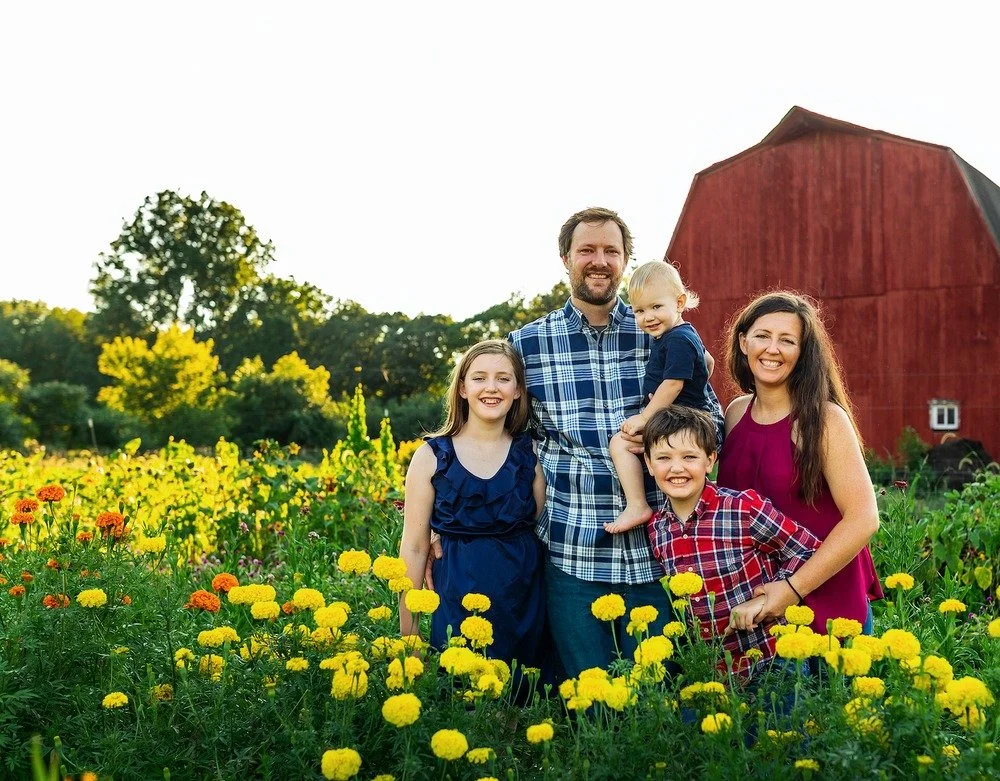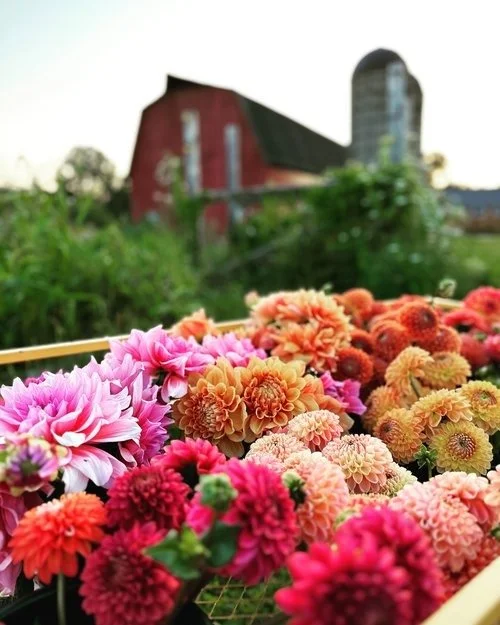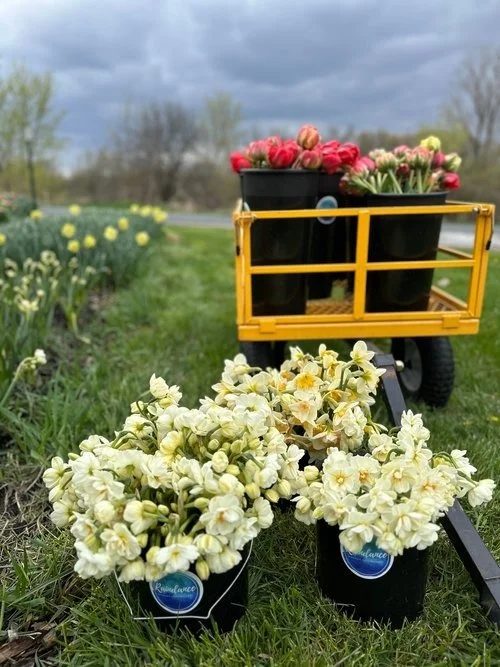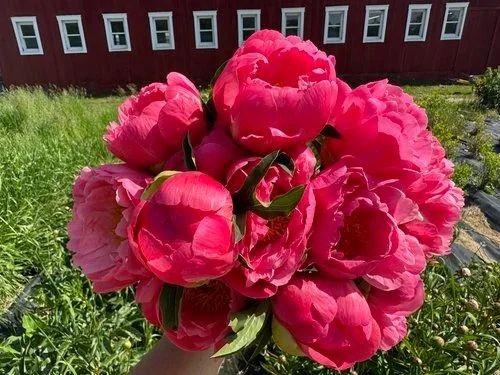The Beauty Of Local Flowers On And Off The Farm: Raindance Farm
Kristen Muelhauser and her family at Raindance Farm
Summer is in full swing here in Michigan, and what better way to complement these bright days than with a beautiful bouquet of locally grown flowers? I have seen few flowers as unique and vibrant as those from Whitmore Lake’s Raindance Farm. Kristen Muehlhauser, owner of Raindance Farm, grows a wide variety of flowers year-round, from summer lilies, peonies, and dahlias, to winter-grown daffodils and andenomes. We met with Kristen to discuss how Raindance Farm came to be.
Kristen loved gardening and participated in Project Grow, an organization providing garden resources and plots in Ann Arbor. When she got her plot, she read Animal, Vegetable, Miracle by Barbara Kinsolver, a book about a family sustaining themselves solely off their local food supply for a year. Kristen discovered her love of growing food sustainably. Ten years later, the charm of a farm in Northfield Township caught Kristen’s attention, and she and her husband purchased it.
“It’s from the 1890’s, when some homesteader dug with a shovel, took some stones out of the field, and lined the foundation. In 2018, we started a CSA (community supported agriculture program). The first year, about 20 families came out to our farm. They harvested their share of vegetables every week, and we threw in some flowers on the side. Parents who were home with their young kids came, and we all sat in the blazing sun on some hay bales in the barnyard.
“We built one unheated Farmer’s Friend caterpillar tunnel and put in tomatoes and cucumbers. We had this great plan for what was going to go outdoors, but our weeds got to be three feet tall. It was my first year, I didn’t have the labor, and I was trying to raise kids, so it was a little nuts, but the people who came that year were so enthusiastic and generous and wanted to do it again.”
As each year passed, more families visited the farm, and Kristen and her husband added more tunnels, expanding the farm and the opportunity for the community to visit and partake in the harvest.
“We added one small tunnel every year. Of course, the pandemic happened. That year, we ended up with 100 families at the farm every week. The flower patch got bigger. A bunch of moms said ‘This is my favorite part! My kids run around and pick cucumbers and eat them off of the bush, and I get to stand in this field, take these flowers home and put them on the table. It reminds me all week while I’m doing the mundane things that there’s joy and beauty in the world.”
People found solace in the flowers growing on Raindance Farm, bringing them home to brighten the dark days of the pandemic. Kristen’s flower patches grew bigger each year, and she realized that these brought her the most joy on the farm. As Kristen and her husband later welcomed their third child, they decided to put all of their energy as farmers into growing flowers.
“In 2023, I decided to take a sabbatical year and had my third kiddo. The farm had 7 or 8 people working there, so it was a very busy, full life. So that year, I just grew flowers and let go of growing vegetables. It made me so happy. Sometimes cutting out the things that are the most challenging and just going with what brings joy can be amazing.”
So, what’s the difference between growing flowers and growing produce?
“You still start with seeds, transplant, weed, irrigate, harvest, and take to market. I would say the main thing that’s different about vegetable production is that there’s a ton of washing and packing. Being first generation farmers with a bootstrap budget, we don’t have the newly built barn with the correct food safety walls. That takes a ton of time when you’re not set up well.
“Flowers are also very labor intensive and take up a lot of time. We make bouquets, which is probably equal in labor, but I think the crew of folks that have stuck around, we love making bouquets. I just don’t feel the same way about washing dirt out of green onion roots.”
We talked about what it takes to grow flowers in Michigan, and what flower season looks like.
“In Michigan, with early spring perennials, you can harvest in May, but the cut flower season is mid-July through the first frost in early October, depending on the weather that year. It’s a 12-15 week season, and that’s it. What’s great about growing in protected spaces is the bulbs that have all of that energy from the blooms stored in them, we can force flowers most of the year.
“Early spring perennials are a bigger investment, the seed stock is very expensive, and it’s riskier because if a big storm does come in winter and blow down our high tunnels, we’re in big trouble. But, we try to choose wisely and ask our farmer friends for help to build something that would withstand the weather. We’re focused on growing the blooms we can in October through May when there isn’t a lot of color. Michiganders need a lot more cheer January through March.”
Kristen’s farm has 14 main flower crops, but she grows about 50 different varieties of flowers.
“We grow a lot of flowers. In the spring and now in the winter, we grow a lot of anemones; tulips; and daffodils, which is kind of surprising. There are so many fun, special ones.
“That’s followed up by peonies, dahlias, and sunflowers. We do something special with heirloom chrysanthemums in the fall. We’re researching what we’re going to plant on September 1st for Christmas and the winter holidays. We’re trying to hit that date in December, which is hard because there’s very little sunlight in Michigan. We’re trying to get a bunch of successions going to see what works well in our latitude with less than 10 hours of sun.”
Despite the challenges that come up with growing in the cold Michigan climate, Kristen notes why it is so important to purchase locally grown flowers, as opposed to the ones you can get in any major grocery store.
“We work hard to follow best practices for cut flowers, so if you pick up your flowers at the farmer’s market while it’s cool outside, a lot of our flowers will last 2-3 weeks. Customers say ‘These last so much longer than the ones at the grocery store.’ This is because 80% of flowers in America are imported, mostly from South America and Europe. There used to be a big cut flower industry here. Because of trade and tariff changes in the 70’s, it became inexpensive for farms in South America to ship flowers here. But there’s been a resurgence in the last 5-10 years.”
With major grocers sourcing flowers internationally, that travel does not bode well for the quality of the flower. Flowers grown locally, which also support our ecosystems and native pollinators, are a better quality. When you purchase a bouquet from Kristen, each bouquet is crafted with care by her and her staff, and they were also likely harvested that morning!
“What’s available in grocery stores is limited. There are few species of flowers that can last for a month in a bucket of water, or that can be shipped without being in water. What can is basically what you see in a major grocery store; mums, roses, and carnations. These are flowers that will brighten someone’s table and bring some color in the winter, but they’re really common.
“What’s great about local flowers is that we can grow these super fresh flowers that can’t be shipped. It’s like getting a sweet, fresh strawberry from Slow Farm versus getting a hydroponic one from California. There’s stuff that’s too fragile to go across the world, and that’s what local farms are good at growing. Dahlias don’t ship well, and there are so many dahlia farms in our area. We love that we can grow all of the specialty stuff that you can only get at a local farm.”
Local farms like Raindance Farm also tend to use sustainable practices, which are better for the flowers and the environment. For the first seven years of Raindance Farm’s operation, they were certified organic. Now that they only grow flowers, they forego recertification, but they still maintain organic practices.
“Oftentimes folks that are growing flowers locally have a commitment to using organic and sustainable practices. A small farm is going to have a very different footprint than one that’s chugging diesel on tractors at a large scale. I kind of want to go on this long list of all of these amazing farms in Washtenaw County that are growing flowers, but it’s great to know the person who’s growing your blooms and ask them if they spray, if they’re friendly with pollinators…”
Kristen notes Raindance Farm’s commitment to sustainable practices and focusing on soil health.
“We care a lot about sustainable practices and growing with as light of a footprint as we can have, so we’re not spraying. Organic is more about what you do rather than what you don’t do, so we choose to be really biodiverse. We’re stewarding 44 acres, but we’re only disturbing the soil on 2 of them. Managing and being the best stewards that we can to the other 42 and allowing that to sequester carbon is really important to what we’re doing as a farm and as a family.”
Alex then asked Kristen what her favorite flower is, to which she endearingly responded:
“My birthday is in the first week of June. When my daughter Abby was 7, I was extremely pregnant. It was the pandemic, so things were still shut down. We went down to the hill at the side of our farm. I could only stand up because of my big belly, so I dug the holes, and she carefully put the peony roots in the ground. I kept saying ‘Abby, this is going to be great! These will be blooming when you have children, and maybe for your grandchildren.’
“She was very precise. You can only put peonies an inch below the soil, or else they will get too cold and die off, or if they’re too deep, they’ll never flower. It was a mother-daughter team effort, and now we have an insane amount of peonies blooming. We added another 600 last fall. Give us 5 years and we should have tens of thousands for June.”
You can find Kristen’s flower bouquets at a variety of places here in Ann Arbor, including at both of our Argus Farm Stop markets.
“We sell a lot of flowers at Argus Farm Stop. We make deliveries Mondays and Thursdays. We also sell at the Ann Arbor Farmers Market every Saturday, basically year-round. We have a monthly bouquet subscription that we are really excited to offer 12 months out of the year. We’re one of the flower farms that provides bouquets for the Weekly Flower Subscription at Argus Farm Stop. We may one day open up a farm stand. In 2026, we’d like to have a U-Pick, because our field of flowers is really beautiful, and someone should get to see them besides us!”
Kristen emanates kindness and is committed to quality, community, and sustainability in her farming practices and her personal life. I hear customers talk about how wonderful her bouquets are, and it’s clear after meeting with her that the farmer behind them is just as lovely. As with many of our farmers here in Michigan, Raindance Farm farms in a way that nourishes both the environment and the local community. Opportunities for U-Pick flowers will hopefully arise sometime in 2026, but in the meantime, you can find her bouquets at the Ann Arbor Farmers Market and right here at Argus Farm Stop.




